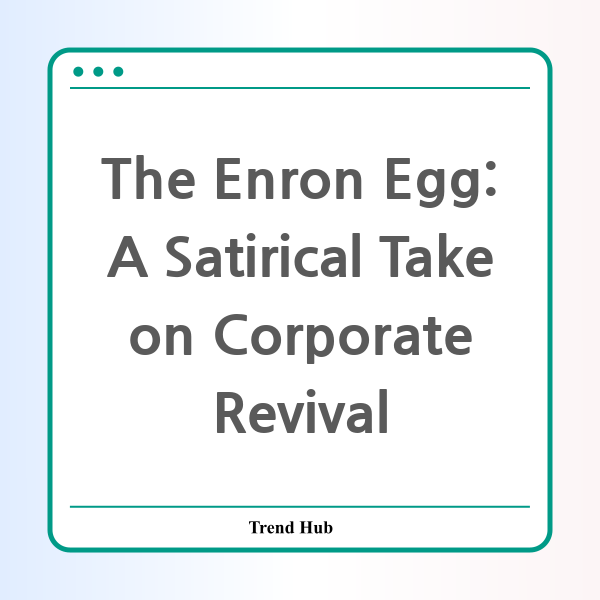* This website participates in the Amazon Affiliate Program and earns from qualifying purchases.

Is the revival of Enron a brilliant satire or just a bizarre prank?
In a move that has sent ripples through social media and beyond, the infamous Enron corporation has resurfaced with a parody product that is anything but ordinary. Meet the “Enron Egg”, a tongue-in-cheek micro-nuclear reactor that promises to “power your entire home for up to 10 continuous years.” But before we dive into the details, let's take a moment to appreciate the absurdity behind this revival.
The launch of the Enron Egg was marked by a theatrical rollout reminiscent of classic Apple product announcements, featuring a five-minute video presentation starring Enron’s “CEO,” Connor Gaydos. In this satirical announcement, Gaydos made outrageous claims, including partnerships with FEMA to distribute Enron Eggs to first responders globally. While it all sounds impressive, this rebranding effort is more a humorous commentary on corporate culture than a serious business initiative.
What’s fascinating about the Enron Egg is its playful jab at both Enron’s notorious past and the eccentricities of Silicon Valley’s product launches. The original Enron, once a giant in the energy sector, became synonymous with corporate greed and scandal. Now, its resurrection as a parody company seems to critique the same culture that birthed such egregious behavior. This is not just about launching a product; it’s about reviving a narrative.
Parody companies are not new. We’ve seen success stories like The Onion that blend satire with social commentary. However, the energy invested into the Enron Egg campaign feels excessive for a joke, leading some to question whether the resurgence of this corporation is, in fact, a clever ruse. It’s almost as if they’re inviting us to ponder: could a company with such a tarnished legacy find a way to engage with the public through humor?
As the situation unfolds, we learn that the company plans to unveil another “groundbreaking” product during the Enron Power Summit, scheduled for January 6. The secrecy surrounding the event has sparked speculation, with rumors circulating about a possible cryptocurrency unveil. The company has yet to clarify the nature of this new product, but the hype—driven by an enigmatic CEO—is palpable.
Moreover, the choice of the event's date sparked controversy. Enron’s leadership hastily assured the public that the date was a coincidence and not a deliberate nod to the U.S. Capitol attacks. This raised eyebrows, prompting critiques of their decision-making and further critique of their handling of public relations.
Despite the speculative nature surrounding the product rollouts, one thing is evident: Enron’s antics underline a broader commentary on modern marketing and company revival methods. The line between serious business and public spectacle has never been blurrier. The questionable practices of both traditional corporations and parody brands invite us to question the ethics behind marketing strategies. At what point does a joke become too much, and what impact does it have on public perception?
Ultimately, whether one perceives the Enron Egg as a satirical masterpiece or an elaborate prank, the conversations it generates are worthwhile. It reflects a society that is skeptical yet curious, ready to engage with the absurdity of corporate practices. With its blend of humor and critique, the Enron Egg serves as an intriguing case study for marketers and consumers alike, illustrating the power of storytelling in corporate communications.
In a world where the line between satire and reality is increasingly ambiguous, let's keep our eyes and minds open. Who knows what the Enron saga will bring next?
* This website participates in the Amazon Affiliate Program and earns from qualifying purchases.